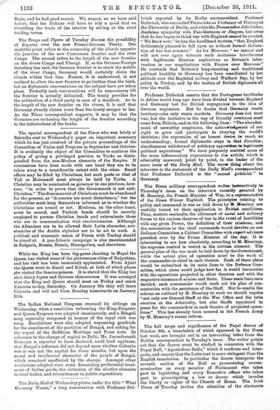The Times military correspondent writes instructively in Thursday's issue on
the interview recently granted by M. Messimy, the French Minister of War, to a representative of the Neues Wiener Tagblait. The principles relating to policy and command in war as laid down by M. Messimy are usefully tested by their application to British conditions. Thus, mutalis mutandis, the allotment of naval and military forces to the various theatres of war in the event of hostilities with any given Power, the definition of their missions, and the nomination to the chief commands would devolve on our Defence Committee, a Cabinet Committee with expert advisers presided over by the Prime Minister of the day. It is interesting to see bow absolutely, according to M. Messimy, the supreme control is vested in the civilian element. The general plan of the war must be laid down by the Government, while the actual plan of operation must be the work of the commander-in-chief in each theatre. Each of these plans would be submitted in its main lines to the Defence Com- mittee, which alone could judge how far it would harmonize with the operations projected in other theatres and with the respective missions of armies and fleets. These main lines once decided, each commander would work out his plan of con- centration with the assistance of the Staff. But to enable the scheme as outlined by M. Messimy to work we should require "not only our General Staff at the War Office and the twin creation at the Admiralty, but also Staffs appointed in peace for the commanders in each theatre of projected opera-' tions." This has already been secured in the French Army by M. Messimy's recent reform.






































 Previous page
Previous page